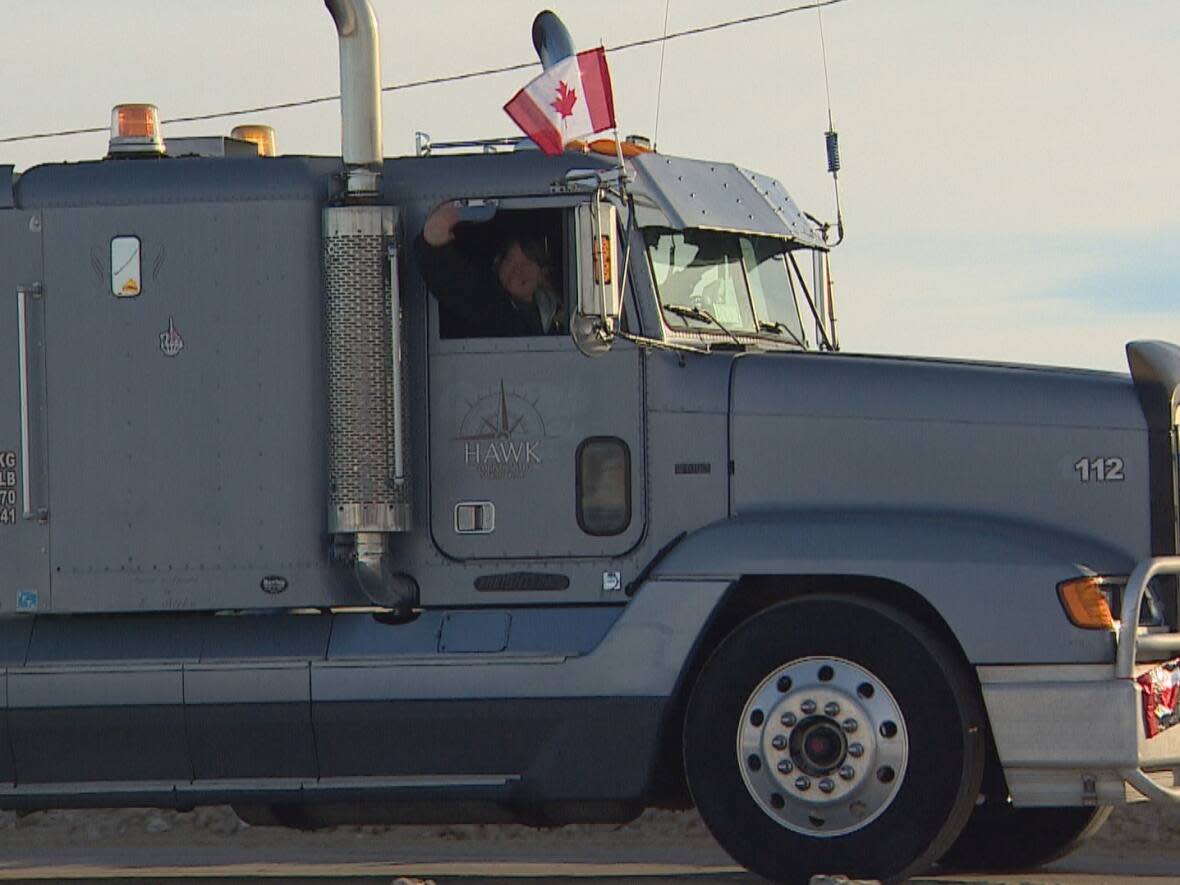Convoy travels through Sask. to protest vaccine mandates for truck drivers

Hundreds of transport trucks are travelling through Saskatchewan on their way to Ottawa to protest the federal vaccine mandate for drivers.
On Monday afternoon, a crowd of supporters went to the Flying J in Saskatoon to welcome the convoy with signs of support.
Earlier Monday, Regina police had said that traffic delays would be caused by one section of the convoy exiting the Ring Road onto Victoria Avenue.
"The Regina Police Service Traffic Safety Unit has been in touch throughout the day with truckers approaching the city from both the North and the West," RPS' news release read.
"All of the semis have now been instructed to use the Regina Bypass to travel south of the City of Regina, rather than have the convoy use the Ring Road and Victoria Avenue East."
Dozens of supporters were reported lining a service road on Highway 1 East Monday night.
The protest
Canada Unity, an anti-public-health-mandate group, organized the truck convoy to Ottawa. According to the group's website, the truckers should arrive in the country's capital by Jan. 29.
As of Jan. 15, truck drivers need to be fully vaccinated if they want to avoid a two-week quarantine and pre-arrival molecular test for COVID-19 before crossing into Canada from the United States.
Unvaccinated or partially vaccinated drivers are also required to get tested when they arrive, and then self-test on Day 8 of a mandatory 14-day quarantine.
Additionally, the U.S. has a mandate in place barring unvaccinated Canadian drivers from delivering goods in America.

Dan Rashovich attended a gathering near Regina in support of the convoy.
"I regard them as patriots," he said. "It's more the mandates. I think that's what this is all about and it's great to see these guys all these truckers, both vaccinated and unvaccinated supporting each other."
Premier Moe says mandate 'unnecessary'
During a COVID-19 press briefing Monday, Saskatchewan Premier Scott Moe was asked whether a convoy was an appropriate response while there are ongoing supply chain issues.
"Ultimately, what we're seeing is a reaction to an unnecessary federal government policy," said Moe.
"I think there is a much better path forward. Maybe it's one of some dialogue between the federal government and our respective trucking associations."

The premier added he hopes those discussions will show respect for what truckers have done for Canadians throughout the pandemic.
"It was our truckers that were the courageous ones that went. Prior to the vaccine, prior to any of the tools that we do have available ultimately here today."
Moe said the majority of truckers are vaccinated, and that he hopes everyone is following the rules and regulations in place.
Andrew Scheer, MP for Regina—Qu'Appelle, attended a gathering in support of the convoy.
"We understand what they're fighting for. They're fighting to make their own healthcare decisions without losing their livelihood and raising awareness for the impact that it's going to have on Canadians' ability to get groceries and other types of goods," he said.
CTA denounces protests on roads
In an article on its website, the Saskatchewan Trucking Alliance noted between 83 and 87 per cent of Canadian truckers are vaccinated.
The Canadian Trucking Alliance (CTA), a national federation of provincial trucking associations, issued a statement Sunday, denouncing protests on highways, roads and bridges.
The organization suggested members opt to hold organized protests on Parliament Hill, or contact their local MP.
Both the CTA and the American Trucking Associations say up to 26,000 of the 160,000 drivers who make regular trips across the Canada-U.S. border are likely to be sidelined as a result of the vaccine mandate.



